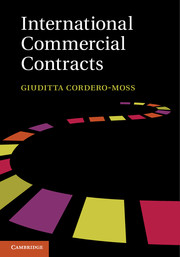Book contents
- Frontmatter
- Contents
- Preface
- Introduction
- 1 Contract practice and its expectations in terms of the governing law
- 2 The role of transnational law
- 3 The impact of the governing law
- 4 Which state law governs an international contract?
- 5 Does arbitration ensure a self-sufficient contract?
- 6 Conclusion
- Bibliography
- Index
1 - Contract practice and its expectations in terms of the governing law
Published online by Cambridge University Press: 05 June 2014
- Frontmatter
- Contents
- Preface
- Introduction
- 1 Contract practice and its expectations in terms of the governing law
- 2 The role of transnational law
- 3 The impact of the governing law
- 4 Which state law governs an international contract?
- 5 Does arbitration ensure a self-sufficient contract?
- 6 Conclusion
- Bibliography
- Index
Summary
The rationale of contract drafting
International contracts are often written on the basis of rather standardised models that are mainly drafted in English and, therefore, they employ a common law drafting style. This does not mean, however, that the parties intend the contract to be subject to English law. Often, contracts are governed by a law that does not belong to the common law family, and this may create tensions between the contractual provisions and the governing law. To minimise the risk of the governing law interfering with the agreed terms, international contracts are drafted in a style that aims to create an exhaustive, and as precise as possible, regulation of the underlying contractual relationship, thus attempting to render redundant any interference from external elements such as the interpreter’s discretion or the rules and principles of the governing law.
To a large extent, this degree of detail may achieve the goal of rendering the contract a self-sufficient system, thus enhancing the impression that, if only they are sufficiently detailed and clear, contracts will be interpreted on the basis of their own terms and without being influenced by any governing law. This impression, however, has been proven to be illusionary, and not only because governing laws may contain mandatory rules that may not be derogated from by the contract. As a matter of fact, not many mandatory rules affect international commercial contracts, although there are important mandatory rules, for example, in the field of the limitation of liability, that are also relevant in the commercial context. Perhaps more importantly, the governing law, which may vary from contract to contract, will affect consciously or not the way in which the contract is interpreted and applied. Notwithstanding any efforts by the parties to include as many details as possible in the contract in order to minimise the need for interpretation, the governing law will necessarily project its own principles regarding the function of a contract, the advisability of ensuring a fair balance between the parties’ interests, the role of the interpreter in respect of obligations that are not explicitly regulated in the contract, the existence of a duty of the parties to act loyally towards each other and the existence and extent of a general principle of good faith – in short, the balance between certainty and justice.
- Type
- Chapter
- Information
- International Commercial ContractsApplicable Sources and Enforceability, pp. 8 - 26Publisher: Cambridge University PressPrint publication year: 2014



